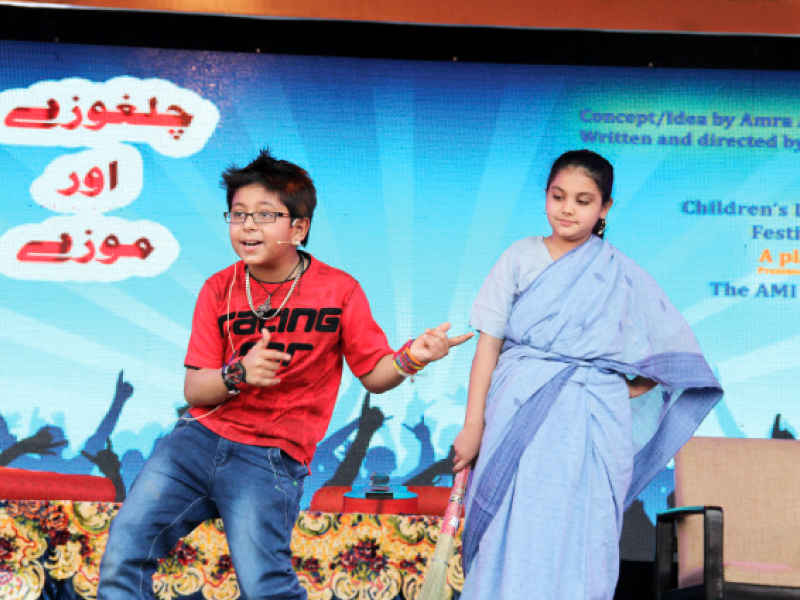
KARACHI:
We are the stories that we tell. It is these narratives that are often related to us at bedtime that have the most profound impact on our psyche in the formative years. At a session, titled “Addressing conflict through reading”, at the Children’s Literature Festival, Shanta Dixit, the founder of the Rato-Bangla School in Nepal, reminded parents and teachers of the importance of storytelling exercises for the cognitive development of young minds.
As the session commenced, Dixit invited the audience to form a circle around her and close their eyes as she read out the story. The story she read was from an award-winning children’s book, titled ‘Best Friend’. The vocabulary of the book was fairly simple, yet its content quite deep. What was refreshing was the way Dixit read out the story and the way she interacted with the audience throughout the session.
Angela Hassan, who was assisting Dixit, translated the narrative into Urdu to facilitate the audience. At several times during the recitation, Dixit paused to ask the audience to reflect on what had just occurred in the story. “I understand that there are a lot of older people here. What I want is for you to visualise the story and then give me your interpretation of the events,” she asked of the audience. “The older people will likely have various interpretations through their experience over the years. The younger minds would have a more focused vision,” she explained.
The story itself was an account of two best friends, one of whom moved had to move away to a different school. It related how the two friends initially encountered difficulties in moving on and then made new friends which made the transition bearable. What was especially pleasing about the story was the impact it had on the children among the audience. When questioned regarding the story at several times, the children enthusiastically gave their input on how they could relate to it with their own experiences.
In the question and answer session that followed the recitation, Dixit asked parents what they thought of literature like this for children. One of the audience members, a middle-aged man who was there with his two children and his wife, rose to deliver a nostalgic speech about his childhood days and the stories that his mother had narrated to him at bedtime. “It is unfortunate that we have stopped telling stories to our children. I still remember the stories my mother used to tell us. The lessons I learnt from them are part of who I am today.”
Another member of the audience, who was there with his wife and six-year-old son, agreed. “The idea is that with these stories, we are able to speak to our children at the same mental level,” he reasoned. A woman, who claimed to be a teacher at a public school, complained that parents nowadays preferred to seat their children in front of the TV or computer while they performed chores. “It is the media that is destroying the minds of our children.”
Evidently pleased with the interaction of the audience and the way the session had played out, Dixit concluded with simple words of advice to the parents and teachers seated among the audience. “Stories such as these must be told in classrooms. They are fun and make the child want to learn more. Children must not only come to the Children’s Literature Festival to have fun. Classrooms can be just as fun too,” she smiled warmly.
Published in The Express Tribune, February 23rd, 2014.
COMMENTS (3)
Comments are moderated and generally will be posted if they are on-topic and not abusive.
For more information, please see our Comments FAQ





































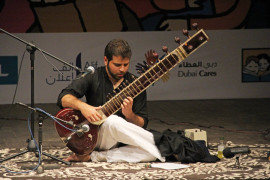
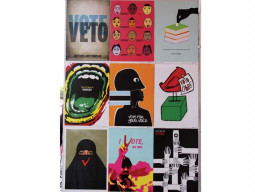
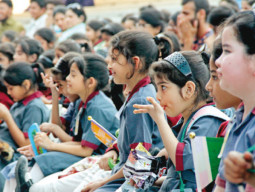






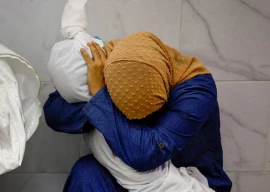




















Thank you Tribune, for the wonderful coverage. I have always considered your newspaper to be authentic and the articles well written. Choosing a session such as "Addressing Conflict Through Interactive Reading" by Shanta Dixit, at the Children's Literature Festival shows your commitment to heal the wounds of our society. It would be amazing and extremely helpful if you kept a niche in your newspaper for tips on how to make the classroom a 'fun' place, I for one would be more than willing to contribute (free of charge) from my "overflowing" cache of a good 37 years of 'fun/activity-based' teaching which my students THOROUGHLY enjoyed and so did I, be it Maths, English Language, English Literature.....all subjects were taught in a 'happy' environment ..... This would be a subtle way of handing a beacon to the die hard "in our days" teachers who think rude, blunt and insulting behaviour is a must ..... and of course smiling in the classroom according to them is a mortal sin. Please keep up the good work and dedication. I would like to add that Ms Dixit returned to Nepal with a load of memories and a very high opinion of the Media and the people of Pakistan. Thank you for that too! I was, am and will always be a "proud Pakistani"
Thank you Tribune, for the wonderful coverage. I have always considered your newspaper to be authentic and the articles well written. Choosing a session such as "Addressing Conflict Through Interactive Reading" by Shanta Dixit, at the Children's Literature Festival shows your commitment to heal the wounds of our society. It would be amazing and extremely helpful if you kept a niche in your newspaper for tips on how to make the classroom a 'fun' place, I for one would be more than willing to contribute (free of charge) from my "overflowing" cache of a good 37 years of 'fun/activity-based' teaching which my students THOROUGHLY enjoyed and so did I, be it Maths, English Language, English Literature.....all subjects were taught in a 'happy' environment ..... This would be a subtle way of handing a beacon to the die hard "in our days" teachers who think rude, blunt and insulting behaviour is a must ..... and of course smiling in the classroom according to them is a mortal sin. Please keep up the good work and dedication. I would like to add that Ms Dixit returned to Nepal with a load of memories and a very high opinion of the Media and the people of Pakistan. Thank you for that too! I was, am and will always be a "proud Pakistani"
Never knew women in Pakistan wear saris ? Guess ET is pandering to its Indian viewer base again !!